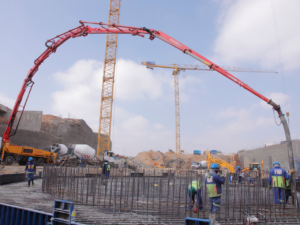The Bargaining Council for the Civil Engineering Industry (BCCEI) is a statutory body created under the Labour Relations Act 66 of 1995. Kirsten Kelly talks to Lindie Fourie, operations manager of the BCCEI, who sets straight some myths and misconceptions related to the council.
Myth 1: BCCEI’s collective agreements are voluntary or do not apply to me

Lindie Fourie, Operations Manager of the BCCEI
Myth 2: BCCEI have no muscle
Designated agents are appointed by BCCEI and approved and registered by the Minister of the Department of Employment and Labour. They investigate complaints received against employers and companies. They have the authority to access construction sites, interview employees and gather documentation. It is their responsibility to monitor that everyone in the civil engineering sector that falls within BCCEI’s registered scope complies with the collective agreements. If there is a non-compliance, the first step would be to try and remedy the situation. However, if the offending party refuses to engage, BCCEI will issue a compliance order in terms of the Labour Relations Act. Should the party fail to comply within 14 days, the matter will be referred to arbitration where arguments can be made from both sides. If an independent commissioner rules in favour of the BCCEI, and the party still fails to comply, an enforcement process will be initiated by BCCEI’s legal department that can ultimately result in the attachment of assets by the Sheriff of the Court.Myth 3: BCCEI is here to penalise employers
“Our primary aim is to assist everyone working in the civil engineering space to comply with the collective agreements. An exemption process exists for companies that are currently not in the financial position to currently meet all of the provisions of the collective agreements. All applications are heard by an exemption board comprised of specialists. These experienced individuals are well aware that the civil engineering sector is under enormous pressure and take this into account while ensuring that both the employer and the employee’s respective rights are protected,” explains Fourie. Designated agents often educate businesses on the collective agreements before these businesses respond to tenders.BCCEI aims to educate and voluntary bring people on board.
“We are here to help. We have no intention to close business down or contribute towards job losses. We want to grow the industry and create investor confidence so that there are more construction sites. A stable, ethical industry is more attractive to investors,” she adds.
Myth 4: BCCEI only benefits employees
 “There is a huge benefit to having access to a national negotiating forum as opposed to site-based negotiations. Furthermore, many employers do not have an in-house labour lawyer or industrial relations specialist that deals with negotiations and demands that come from labour. But seasoned representatives from the organisations within the BCCEI can negotiate on behalf of the civil engineering industry. This then saves employers time and money,” says Fourie.
She emphasises that the BCCEI ‘levels the playing field’ where labour rates are the same everywhere. Tenders are then secured based on experience and skill and not on undercutting on employee wages. “We can also influence policy. We engage and collaborate with other industries and government entities and can put businesses in contact with the correct individuals to give them the necessary assistance they need.”
“For instance, with the extortion on construction sites, we have engaged with the South African Police Service (SAPS) and have a contact list of who exactly businesses should contact should they experience extortion. If any civil engineering company is experiencing difficulty on site, please contact us so that we can put you in touch with the relevant people.”
BCCEI also collaborates with the Health and Safety Division in the Department of Employment and Labour as well as the Sectoral Education Training Authorities (SETAs) (Construction, Education and Training Authority CETA) in terms of skills training and assists with the allocation of skills development grants and prior recognition. They also provide a platform for employees to give input regarding employment conditions and labour relations if they are not actively participating through employee organisations.
Companies can also receive a letter of good standing from BCCEI as proof that they are fully complaint with all of the collective agreements. “This is proof of good governance, and we have seen a significant increase in requests for this certificate as part of tender requirements,” explains Fourie.
“There is a huge benefit to having access to a national negotiating forum as opposed to site-based negotiations. Furthermore, many employers do not have an in-house labour lawyer or industrial relations specialist that deals with negotiations and demands that come from labour. But seasoned representatives from the organisations within the BCCEI can negotiate on behalf of the civil engineering industry. This then saves employers time and money,” says Fourie.
She emphasises that the BCCEI ‘levels the playing field’ where labour rates are the same everywhere. Tenders are then secured based on experience and skill and not on undercutting on employee wages. “We can also influence policy. We engage and collaborate with other industries and government entities and can put businesses in contact with the correct individuals to give them the necessary assistance they need.”
“For instance, with the extortion on construction sites, we have engaged with the South African Police Service (SAPS) and have a contact list of who exactly businesses should contact should they experience extortion. If any civil engineering company is experiencing difficulty on site, please contact us so that we can put you in touch with the relevant people.”
BCCEI also collaborates with the Health and Safety Division in the Department of Employment and Labour as well as the Sectoral Education Training Authorities (SETAs) (Construction, Education and Training Authority CETA) in terms of skills training and assists with the allocation of skills development grants and prior recognition. They also provide a platform for employees to give input regarding employment conditions and labour relations if they are not actively participating through employee organisations.
Companies can also receive a letter of good standing from BCCEI as proof that they are fully complaint with all of the collective agreements. “This is proof of good governance, and we have seen a significant increase in requests for this certificate as part of tender requirements,” explains Fourie.





